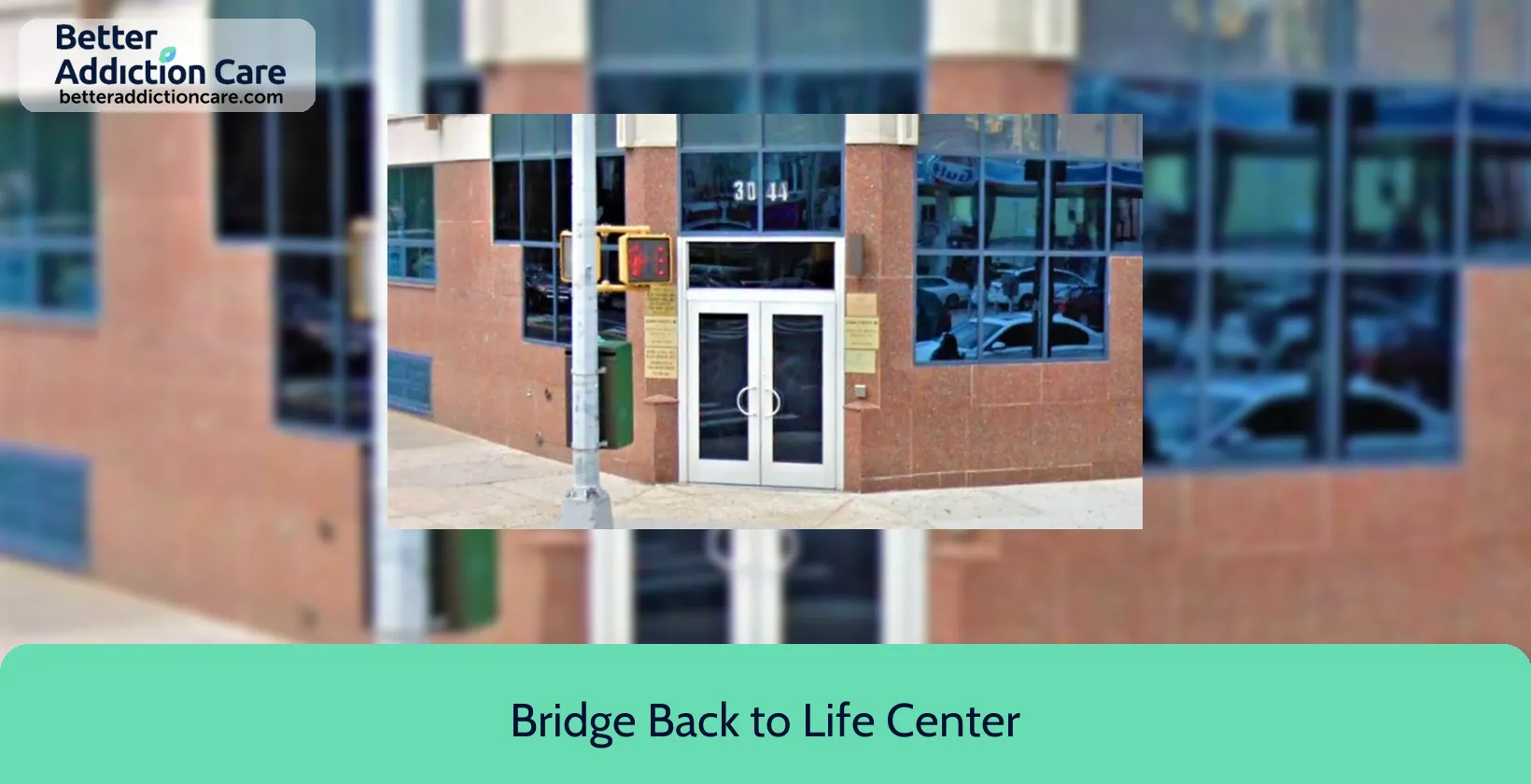Bridge Back to Life Center
Overview
Specializing in drug misuse treatment, Bridge Back to Life Center - Coney Island Avenue is a comprehensive outpatient rehabilitation clinic situated in Brooklyn, New York. This institution offers a wide variety of services that are customized to fit the specific requirements of its diverse clientele, such as dual diagnosis care, aftercare planning, and medication-assisted therapy (MAT). In order to provide a comprehensive route to wellbeing, the center's integrated approach to recovery is made to treat co-occurring mental health disorders in addition to addiction.
For a broad range of demographics, including teenagers, the elderly, young adults, members of the armed forces, LGBTQ+ people, and those with hearing impairments, the institution provides customized programs. These committed programs provide a supportive atmosphere that promotes healing and long-term rehabilitation while attempting to address the unique issues experienced by each population. Bridge Back to Life Center's dual diagnosis care for individuals with co-occurring illnesses treats mental health and drug use issues concurrently, enabling a more thorough approach to treatment.
The MAT program, which includes the induction and maintenance of FDA-approved drugs like buprenorphine and vivitrol, is at the heart of their treatment options. A range of evidence-based treatments are included in individualized care plans that are often used in conjunction with this strategy. The rigorous individual, group, and family counseling sessions that clients receive make use of tried-and-true techniques including motivational interviewing, trauma therapy, dialectical behavior therapy, and cognitive behavioral therapy (CBT). By treating the mind and body, complementary treatments such as creative arts therapy, meditation, Eye Movement Desensitization and Reprocessing (EMDR), and experiential therapy facilitate recovery.
Bridge Back to Life Center's aftercare programs underscore the value of ongoing assistance. Patients participate in dynamic, integrative programs that adjust to their requirements as they move from active treatment toward long-term recovery. Along with connecting clients to essential medical, mental health, and social service resources, the facility also helps with recommendations for sober housing arrangements, 12-step program introduction, and other services.
Bridge Back to Life Center was founded in 1988 and has been recognized as a pioneer in the New York Metropolitan region for addiction treatment. The clinic has expanded its scope under the direction of Executive Director Gary Butchen, offering not only treatment for addicts but also assistance and education for their loved ones. This wide-ranging network of support is essential to assisting clients in maintaining long-term sobriety from drugs, alcohol, and other substances that change mood, as well as in resolving associated problems such emotional, financial, family, legal, and spiritual difficulties.
In order to operate chemical dependence treatment programs, Bridge Back to Life Center, a New York State OASAS-licensed institution, upholds the highest standards of care. The facility takes many forms of payment, including self-pay, employee assistance programs, Medicare, Medicaid, private insurance, and military insurance. In order to guarantee that those in need of assistance may get the required care regardless of their financial situation, financial aid is also offered.
Committed to bringing about long-lasting positive transformations in the lives of those impacted by addiction, Bridge Back to Life Center is at the forefront of delivering efficient, compassionate treatment. They seek to assist clients in reconstructing their lives in a way that fosters long-term health, productivity, and satisfaction free from the limitations of drug misuse. Their purpose extends beyond just treating the symptoms of addiction.
Bridge Back to Life Center at a Glance
Payment Options
- Cash or self-payment
- Medicaid
- Medicare
- Private health insurance
- Federal military insurance (e.g., TRICARE)
Assessments
- Screening for tobacco use
- Comprehensive mental health assessment
- Comprehensive substance use assessment
- Outreach to persons in the community
- Screening for mental disorders
Age Groups
- Seniors or older adults
- Adolescents
- Young adults
- Seniors
Ancillary Services
- Case management service
- Integrated primary care services
- Suicide prevention services
- Specially designed program for DUI/DWI clients
- Domestic violence services, including family or partner
Highlights About Bridge Back to Life Center
7.58/10
With an overall rating of 7.58/10, this facility has following balanced range of services. Alcohol Rehabilitation: 8.00/10, Drug Rehab and Detox: 8.15/10, Insurance and Payments: 6.00/10, Treatment Options: 8.18/10.-
Treatment Options 8.18
-
Drug Rehab and Detox 8.15
-
Alcohol Rehabilitation 8.00
-
Insurance and Payments 6.00
Treatment At Bridge Back to Life Center
Treatment Conditions
- Alcoholism
- Mental health treatment
- Substance use treatment
- Co-occurring Disorders
- Opioid Treatement
Care Levels
- Outpatient
- Outpatient detoxification
- Outpatient methadone/buprenorphine or naltrexone treatment
- Intensive outpatient treatment
- Regular outpatient treatment
Treatment Modalities
- Cognitive behavioral therapy
- Telemedicine/telehealth therapy
- Substance use disorder counseling
- Trauma-related counseling
- Smoking/vaping/tobacco cessation counseling
Ancillary Services
Languages
- Spanish
- Other languages (excluding Spanish)
- Hebrew
- Polish
- Russian
Additional Services
- Pharmacotherapies administered during treatment
- Mentoring/peer support
- Breathalyzer or blood alcohol testing
Special Programs
- Clients with co-occurring mental and substance use disorders
- Veterans
- Active duty military
- Members of military families
- Criminal justice (other than DUI/DWI)/Forensic clients
Get Help Now
Common Questions About Bridge Back to Life Center
Contact Information
Other Facilities in Brooklyn

6.50

6.59

6.71

6.77

6.68

6.71

6.91

7.14
DISCLAIMER: The facility name, logo and brand are the property and registered trademarks of Anchor House, and are being used for identification and informational purposes only. Use of these names, logos and brands shall not imply endorsement. BetterAddictionCare.com is not affiliated with or sponsored by Anchor House.

